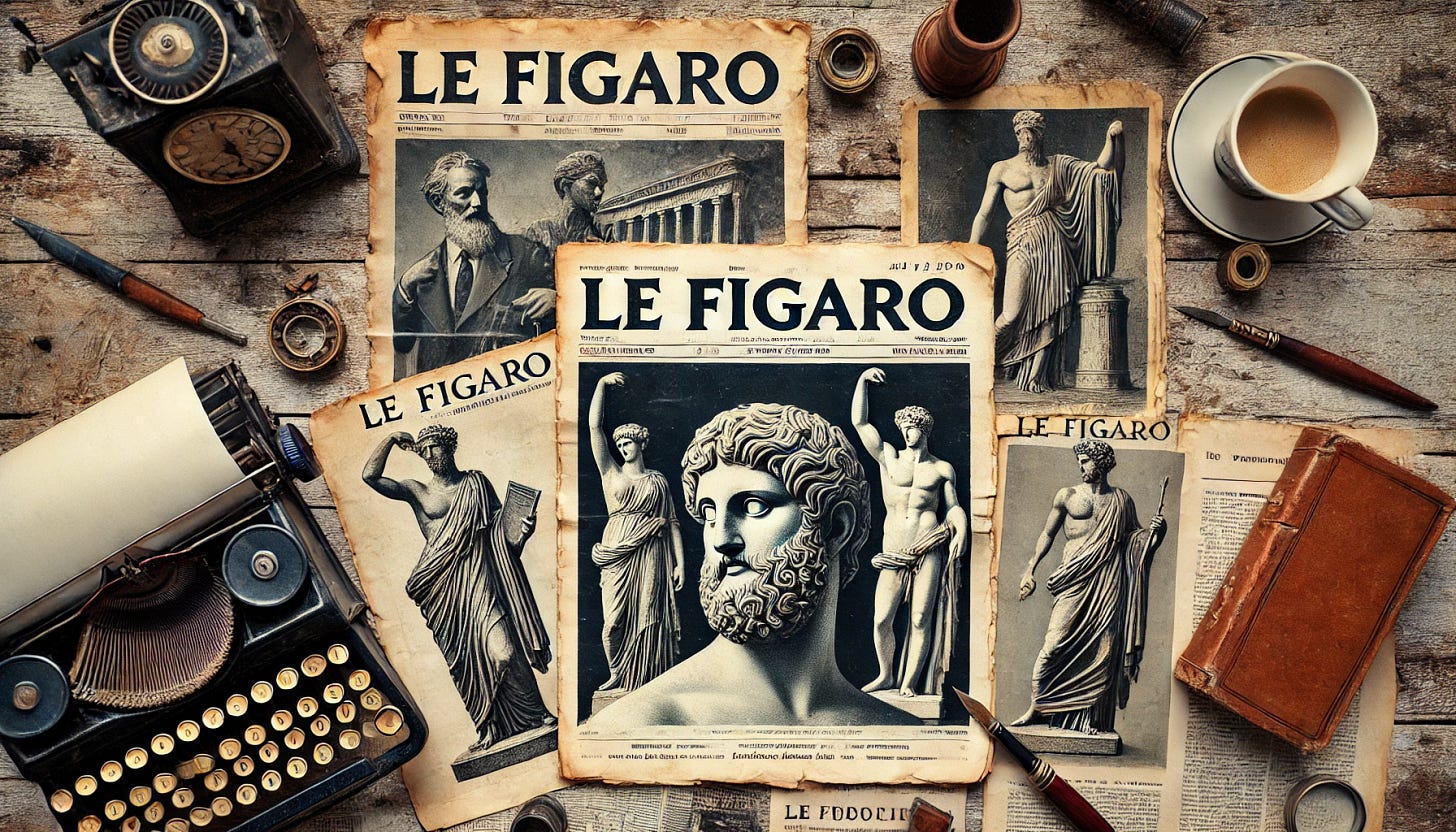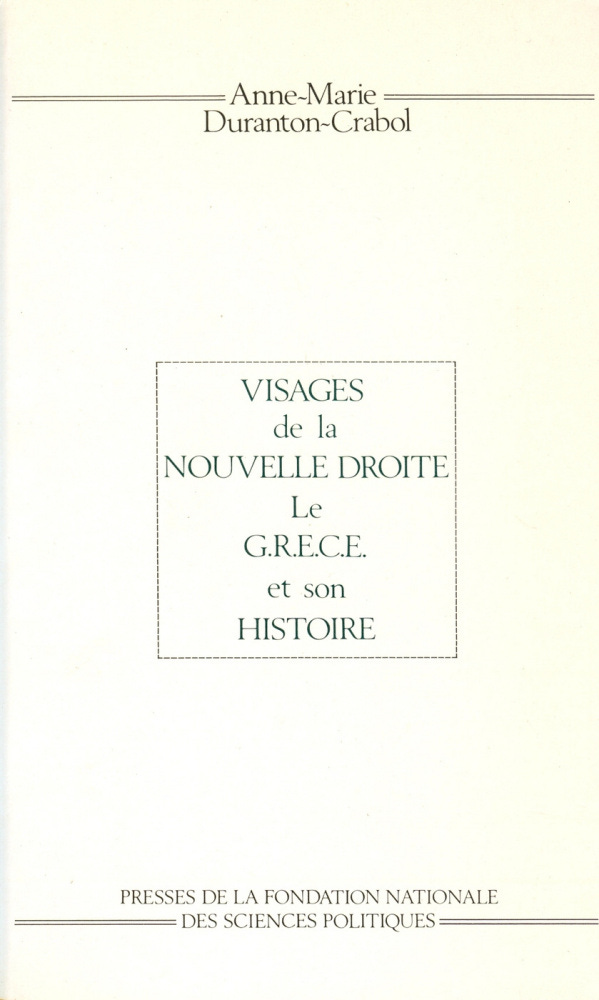This essay is a bit different than most of the translations I host here on this Substack. Academic and historian Anne-Marie Duranton-Crabol wrote it. Duranton-Crabol was one of the first academics to write extensively on the Nouvelle Droite. She wrote “Visages de la Nouvelle droite: le GRECE et son histoire” (Faces of the New Right: GRECE and it’s History). Although Duranton-Crabol was not of the Nouvelle Droite, getting an outsider’s perspective on the movement is interesting.
Her essay explores the rise and decline of the Nouvelle Droite (New Right) in France, a far-right intellectual movement that gained prominence in the late 1970s. Founded by GRECE in 1968, the movement sought to influence elites by reviving pre-Christian European paganism, rejecting egalitarianism, and promoting the value of "difference" over universalism. Spearheaded by Alain de Benoist, it gained traction in intellectual circles and mainstream media but faced backlash during a 1979 debate that marked the start of its decline. By the early 1980s, the movement lost much of its visibility and influence, overshadowed by the populist rise of the National Front. Despite its reduced impact, the Nouvelle Droite continues to engage in niche intellectual discourse, advocating anti-liberal, anti-capitalist, and anti-imperialist ideas while maintaining a critical stance toward liberal democracy and American cultural hegemony.
Originally published in L’Histoire no. 14 January-March 2002.
Translated by Alexander Raynor
At the end of the 1970s, a far-right movement experienced brief success. Leading a cultural fight against the dominant left in intellectual circles, the Nouvelle Droite (New Right) asserted itself as neo-pagan, anti-egalitarian, and differentialist. It extended its influence into mainstream media and even into the corridors of political parties.
Anti-egalitarian, elitist, and pagan, the Nouvelle Droite held a prominent place in intellectual and political life about twenty years ago. From June to December 1979, its existence sparked a heated foundational debate, marked by nearly a thousand interventions in the press, primarily French but also foreign: did it signify the return of old demons, or was it merely a nonconformist movement? Was it promoting apartheid or diversity?
Although weakened, the echo of this controversy lingered for several years. But the movement's breakthrough was short-lived, and by the early 1980s, it had lost its visibility and influence. What remains today of the ideas defended by this school of thought?
The Nouvelle Droite originated in 1969, with the registration of the statutes of GRECE (Groupement de recherche et d'études pour la civilisation européenne) at the Alpes-Maritimes prefecture — though the movement itself dated back to early 1968. Aiming to break away both from the sterile activism of those disillusioned by the Algerian War and from the nostalgic cult of Pétain, the group targeted elites and aimed to conquer minds.
The success was undeniable: a scholarly journal, Nouvelle École, founded in 1968, was complemented in 1973 by a more militant magazine, Éléments pour la civilisation européenne. In 1976, the Copernic publishing house was established and, the following year, published Vu de droite (View from the Right), the first major work by Alain de Benoist, which won the French Academy's essay prize.
Alain de Benoist played a decisive role. Born in 1943, he became active early on within the ranks of the Nationalist Student Federation (FEN) and contributed to Défense de l'Occident (Maurice Bardèche's magazine) and Europe Action (the "magazine of the white man"). A trained philosopher, de Benoist always demonstrated a keen interest in reading great texts and shaping a worldview. While he denied holding a leadership role within GRECE in the militant sense, his preeminence in the development and dissemination of ideas was uncontested.
GRECE became a genuine ideological laboratory, reviving a body of thought dismissed from intellectual discourse since the 1930s due to its controversial nature, while giving it a resolutely modern guise.
Three core ideas structured its analysis, which aimed to meet the needs of a future Europe. The first was the rejection of the Judeo-Christian, monotheistic, and egalitarian heritage as a prerequisite for restoring the organic bond that once united the elite and the people under the Indo-European trifunctional model of nobility, clergy, and workers. According to the Nouvelle Droite — the second core idea — the elite individual, particularly one with high biological and intellectual heritage, must reconnect with Europe's pre-Christian pagan legacy. This would enable the emergence of a new historical cycle free from egalitarian leveling and commercial liberalism. Finally, the third core idea: while denouncing both naive universalism and despicable xenophobia, the Nouvelle Droite upheld "difference" as the supreme value. Its theorists were particularly scornful of those who suggested that this was merely a euphemism for racism.
These propositions attracted people well beyond the irreducibly anti-Gaullist circles in which the group initially took root. Stimulated by meetings, summer universities, and even pagan celebrations of the solstice, members soon formed the nucleus of a vast network. Integrated into the press group chaired by Raymond Bourgine at the time, including the weekly Valeurs actuelles, the Nouvelle Droite's best writers were introduced by Louis Pauwels to Figaro Magazine, founded in 1978. Productive contacts within the Club de l'Horloge were accompanied by convergence with certain political figures of Giscardian conservatism, such as Michel Poniatowski and Jacques Médecin.
The lists of patrons of Nouvelle École and participants in conferences and colloquia demonstrated the intellectual interest in the Nouvelle Droite: French academicians Thierry Maulnier, René Huyghe, and Pierre Gaxotte; Indo-Europeanists Jean Varenne, Jean Haudry, and briefly Georges Dumézil; sociologists like Julien Freund; and writers such as Raymond Abellio, Jean Cau, and Louis Pauwels. Foreign intellectuals, including Mircea Eliade, Arthur Koestler, and Konrad Lorenz, enjoyed international renown.
The 1979 debate, already mentioned, had a dual significance: it reflected the anxious realization that a shift had occurred in the intellectual world dominated by leftist thought since the Liberation and that certain ideas from the 1930s remained alive. It was also an indirect homage to GRECE's success. Paradoxically, however, this debate marked the beginning of the Nouvelle Droite's decline.
America: the Enemy
By 1982, the movement had lost most of its mainstream media platforms, and ties with the Club de l'Horloge were severed. Since then, it has become a small training structure, organizing limited public activities — a publishing house (Le Labyrinthe), a quarterly magazine (Éléments), an annual colloquium, and a summer university — and maintaining some footholds in academia. On the Internet, Alain de Benoist launched a column, "Le Lien," offering commentary on current events.
This is complemented by the journal Nouvelle École (one hefty issue per year), Krisis (averaging two issues annually), and an international network of publications expressing a political culture akin to GRECE's.
Despite its longevity and some renewal of leadership, the decline in influence is noticeable. This can be partly attributed to the movement's ideological evolution: its longstanding anti-Americanism shifted to identifying the United States as the primary enemy, particularly as the Soviet Union appeared poised for historical changes. Alain de Benoist, less put off by the "Red Army's cap" than by American "hamburgers," even hailed the left's 1981 electoral victory, attributing it to their successful conquest of "cultural power." These choices led to disillusionment and defections at the grassroots level, while also alarming media executives, who ceased granting the Nouvelle Droite column space.
Simultaneously, the National Front, skeptical of the movement's overly intellectual approach, began its electoral rise, prioritizing "politics first." Jean-Marie Le Pen's party benefited from the defection of several Nouvelle Droite cadres from GRECE, like Pierre Vial, or from the Club de l'Horloge, like Jean-Yves Le Gallou.
Their concerns were reflected in the Identité journal and in National Front slogans, such as denouncing "anti-French racism," akin to GRECE's earlier rejection of "all racisms," including "raciophobia." Their influence also shaped anti-globalist rhetoric, associating globalism with American dominance, while downplaying the significance of other perceived threats like "Islamism." This divisive issue continues to fragment the far-right, notably weakened since 1998 with Bruno Mégret's creation of the National Republican Movement.
Despite a 1993 survey showing that 35% of Éléments subscribers felt close to the National Front, the Nouvelle Droite has emphasized its differences from the latter. Uncomfortable with the Front's populism, GRECE rejects both its narrow Franco-centric worldview and its national-Catholic leanings.
The Intellectuals’ Unease
Anti-capitalist and anti-imperialist, rejecting "economism," which it views as reducing humanity to its utility value, GRECE perceives immigrants as victims, avoiding the hatred seen in the National Front's circles. It advocates cooperation with the Third World, arguing that its development is key to reducing migratory flows, and embraces a form of multiculturalism aligned with its philosophy of "difference." Nevertheless, GRECE aligns neither with Enlightenment values nor liberal democracy, favoring instead an "organic democracy" rooted in a collective identity.
Does GRECE's doctrine still resonate? Or does Alain de Benoist's positioning overshadow its extremist past? Intellectuals from both left and right now willingly contribute to Krisis, a "journal of ideas and debates."
On issues like anti-liberalism, anti-communism, communitarianism, interest in the Arab world, European federalism, or debates on contemporary art, a shared desire to counter aspects of the so-called "dominant" thought prevails. Viewed in this light, the Nouvelle Droite captures the unease of certain intellectuals.






